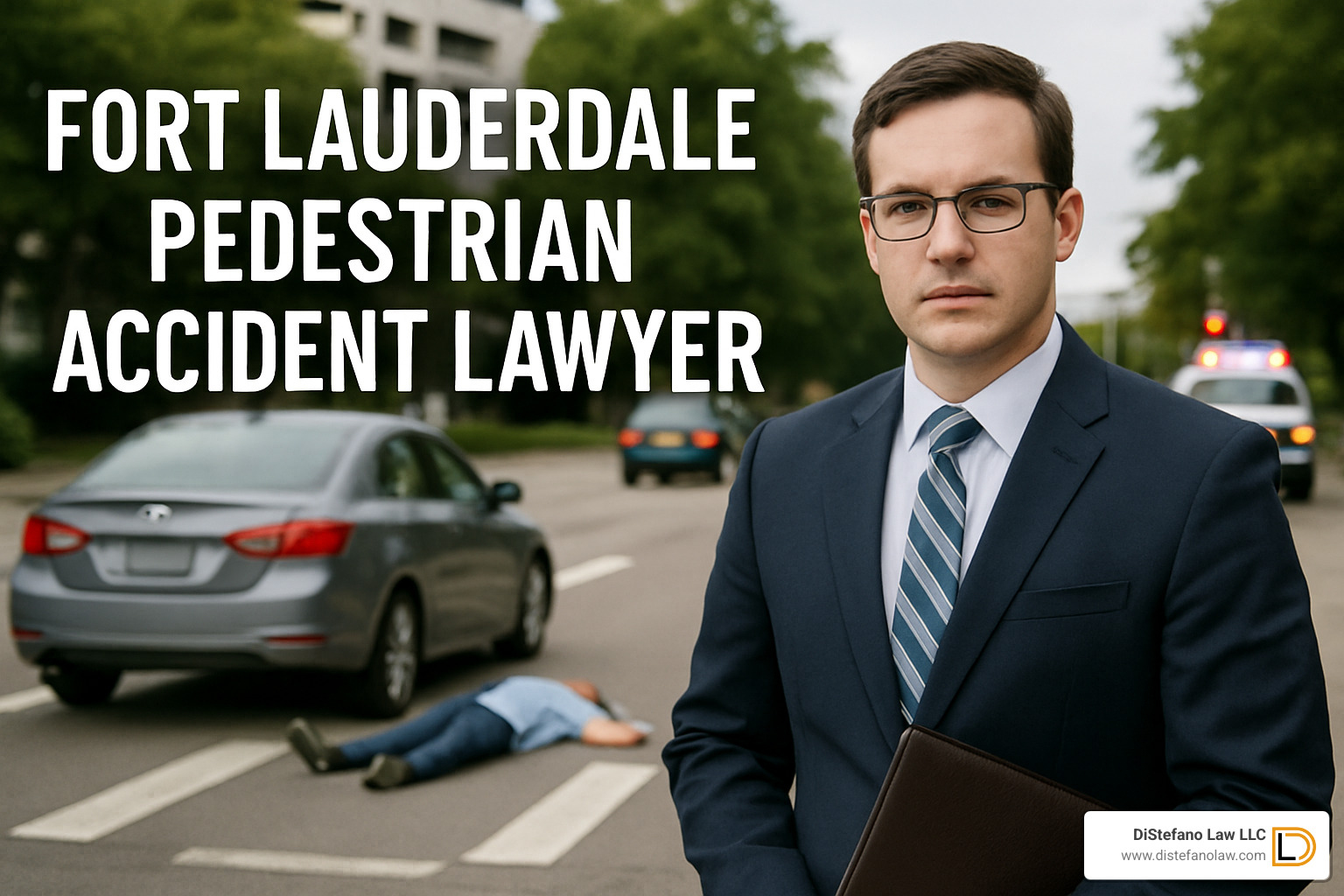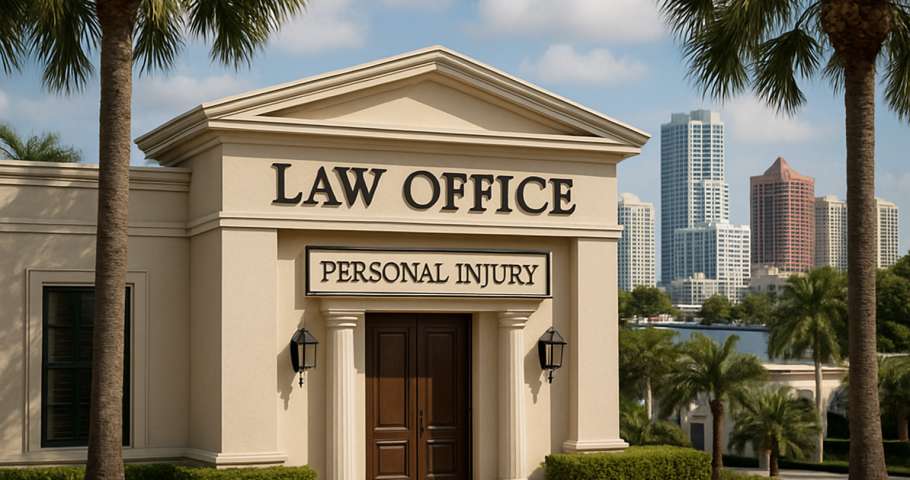Why Pedestrian Accidents Happen in Fort Lauderdale
Fort Lauderdale’s unique blend of tourism, nightlife, and urban sprawl creates a dangerous environment for pedestrians. After 40 years of practice, we’ve identified key factors that put walkers at risk.
Speeding drivers top our list of causes. With tourists rushing to catch flights and locals navigating congested streets, speed limits become suggestions. When a vehicle traveling 40 mph strikes a pedestrian, the National Highway Traffic Safety Administration reports an 85% chance of death.
Distracted driving has exploded with smartphone use. We regularly handle cases where drivers were texting, checking GPS, or scrolling social media when they struck our clients.
Impaired driving spikes during Fort Lauderdale’s busy nightlife hours. The combination of beach bars, cruise ship passengers, and spring break crowds means intoxicated drivers share roads with pedestrians well into the early morning.
Left-turn conflicts occur when drivers focus on oncoming traffic while turning, missing pedestrians in crosswalks. Parking lot incidents are surprisingly common, with drivers backing up in crowded areas frequently striking pedestrians.
Poor lighting conditions compound these risks. Many Fort Lauderdale streets lack adequate illumination, especially during sudden tropical weather changes.
Common Risk Areas & Intersections
Our case files reveal clear patterns in where pedestrian accidents cluster. The downtown core around Las Olas Boulevard sees heavy foot traffic mixing with confused tourists and impatient commuters.
The beach strip along A1A presents unique challenges. Beachgoers cross multi-lane roads to reach parking, often with sun glare and sand-covered windshields reducing driver visibility.
Sunrise Boulevard and Andrews Avenue intersection consistently appears in our caseload. US-1 and Broward Boulevard represents another danger zone with wide lanes encouraging speeding.
Typical Injuries Suffered by Pedestrians
Pedestrian accidents produce some of the most severe injuries we encounter. The human body cannot withstand the force of a multi-thousand-pound vehicle.
Traumatic brain injuries occur when pedestrians strike windshields, hoods, or pavement. Even minor head impacts can cause concussions, while severe cases result in permanent cognitive impairment.
Spinal cord damage ranges from herniated discs to complete paralysis. Fractures affect nearly every part of the body, often requiring multiple surgeries.
Internal bleeding from organ damage can be life-threatening. Post-traumatic stress disorder (PTSD) affects many survivors, causing anxiety and fear of crossing streets.
For comprehensive information about severe injury cases, visit our Pedestrian Accidents page.
How Road & Sidewalk Defects Contribute
Poor infrastructure plays a significant role in Fort Lauderdale pedestrian accidents. We’ve successfully held government entities and property owners accountable for dangerous conditions.
Potholes and uneven pavement cause pedestrians to stumble into traffic lanes. Faded crosswalk markings make pedestrians less visible to drivers. Malfunctioning traffic signals create confusion about right-of-way.
City and state liability applies when government entities fail to maintain safe conditions, though sovereign immunity caps recovery at $200,000. Construction zones present special hazards with temporary barriers and changed traffic patterns.
First 24 Hours: Steps to Take After a Pedestrian Collision
The decisions you make in the first 24 hours after a pedestrian accident will shape your recovery and legal case for years to come. Simple actions taken immediately can mean the difference between a successful claim and a denied one.
Call 911 immediately, even if injuries seem minor. Adrenaline masks pain that will hit you later. That police report becomes your official record of what happened.
Take photos of everything if you’re physically able. Capture vehicles, visible injuries, skid marks, traffic signals, and the overall scene. These images often become the most powerful evidence.
Get witness contact information before they leave. Bystanders provide objective accounts that can counter a driver’s claims that you were at fault.
Seek emergency room care even when you feel “okay.” Concussions, internal injuries, and fractures don’t always show symptoms immediately.
Preserve clothing and shoes as evidence. Damage patterns help experts determine impact angles and vehicle speeds.
Notify your insurance company about the collision. Florida’s Personal Injury Protection (PIP) coverage provides immediate medical benefits regardless of fault.
If distracted driving played a role, our Fort Lauderdale pedestrian accident lawyer team knows how to obtain cell phone records and other evidence.
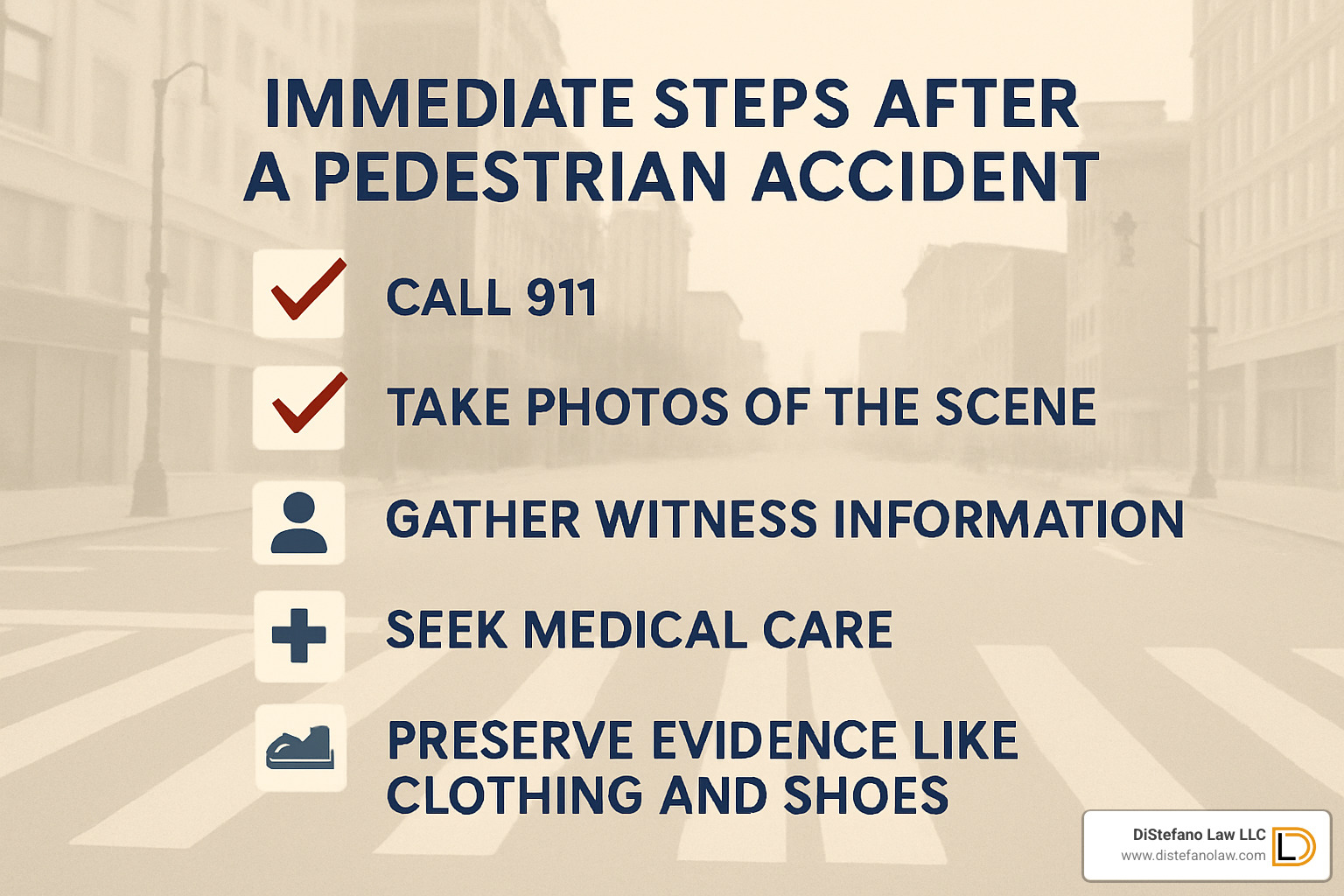
What To Do at the Scene
Your safety comes first. If you can move without causing more injury, get to a safe spot away from traffic. If unsure whether you should move, stay put and wait for paramedics.
Never admit fault or say you’re sorry. Statements like “I’m sorry” can be twisted into admissions of guilt later. Stick to describing what you remember without assigning blame.
Collect the driver’s information including name, license number, insurance details, and vehicle registration. If the driver seems impaired or aggressive, let police handle all interactions.
Don’t sign anything except official police paperwork. Early settlement offers are almost always far below what your case is worth.
Medical & Documentation Timeline
Same-day imaging often reveals injuries not obvious during initial examination. X-rays, CT scans, and MRIs create a medical baseline crucial for evidence.
Schedule follow-up visits with your doctor and specialists. Don’t skip appointments – insurance companies argue that delayed treatment means injuries weren’t serious.
Keep every medical bill and record organized. These documents prove the financial impact and support your compensation claim.
Start an injury diary documenting daily pain levels and activities you can no longer do. This helps quantify pain and suffering damages.
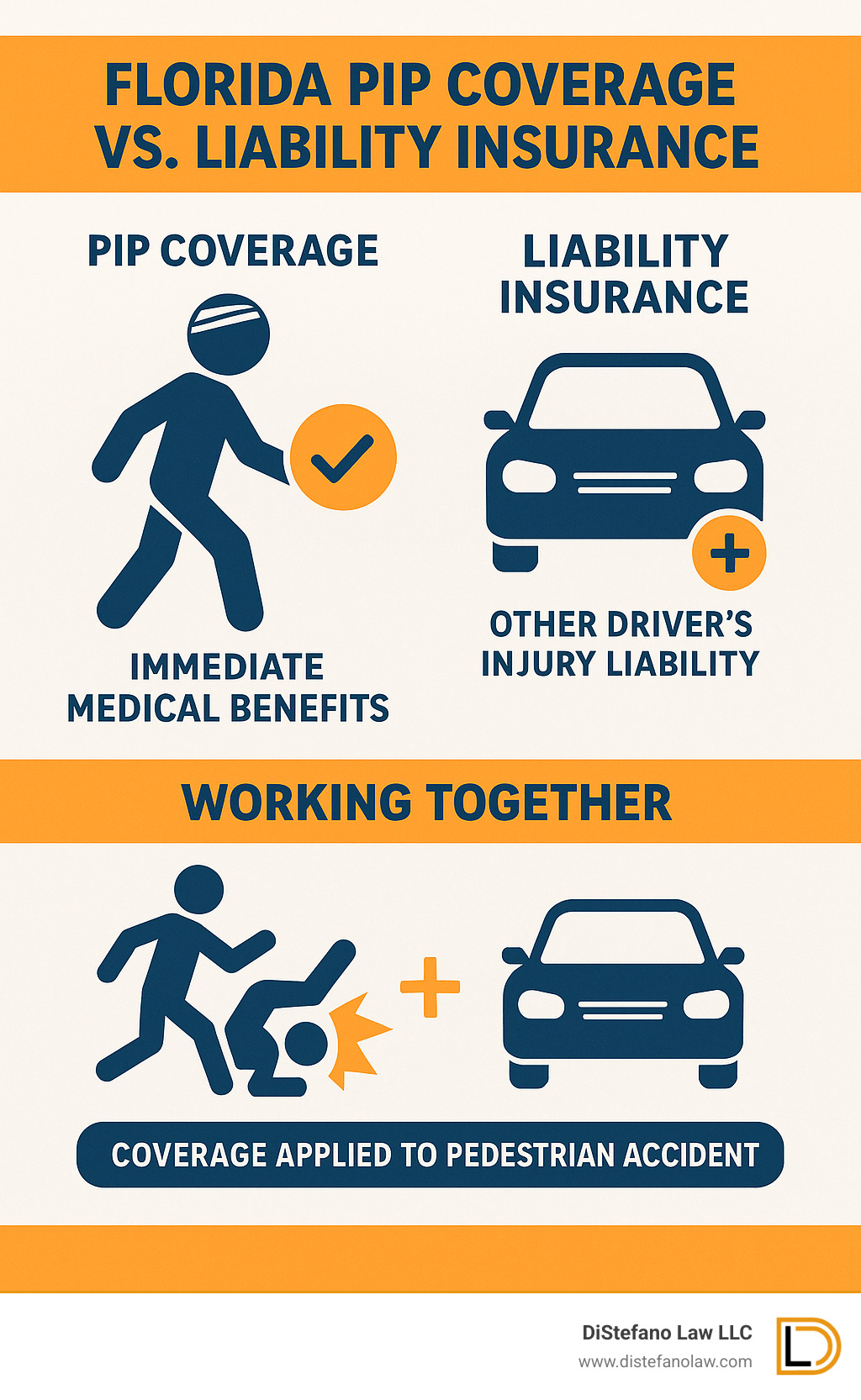
Building Your Case: Fault, Evidence & Florida Laws
After four decades of helping Fort Lauderdale accident victims, we’ve learned that understanding Florida’s unique laws makes the difference between fair compensation and being left with devastating expenses.
Florida operates under comparative fault rules, meaning you can recover damages even if you bear some responsibility. If you were jaywalking when a speeding, texting driver struck you, and a jury determines you were 20% at fault while the driver was 80% at fault, you can still recover 80% of your damages.
The statute of limitations gives you four years to file personal injury claims and two years for wrongful death cases under Florida law. Waiting works against you as evidence disappears and witnesses move away.
Traffic camera footage offers objective proof, but cities typically delete recordings within 30 days. We immediately send preservation letters to prevent crucial evidence from vanishing.
Cell phone records can prove driver distraction at the moment of impact. Black box data from newer vehicles records speed, braking patterns, and steering inputs before crashes.
Accident reconstruction specialists analyze skid marks, vehicle damage, and injury locations to create detailed reports about speeds and driver actions.
Determining Fault in Pedestrian Crashes
Florida law places a duty of reasonable care on all drivers to watch for and avoid striking pedestrians. This duty becomes stronger in areas where pedestrians are expected.
Jaywalking impact varies dramatically based on circumstances. While crossing outside marked areas might create some fault, it doesn’t eliminate your right to compensation if the driver was breaking traffic laws.
Florida’s pure comparative negligence system means your compensation reduces by your fault percentage, but you can still recover damages even if mostly responsible.
Essential Evidence for Success
Scene photographs capture rapidly changing conditions. Medical records form the foundation of damage claims. Witness affidavits provide sworn statements from independent observers.
Surveillance video from nearby businesses and traffic cameras provides compelling evidence. Vehicle telemetry creates an electronic record that’s difficult to dispute.
For more information about vehicle accident cases, visit our Automobile Accidents page.
Hit-and-Run & Uninsured Drivers
Police investigations take priority in hit-and-run cases. Uninsured motorist coverage through your auto insurance becomes crucial when at-fault drivers lack insurance or flee.
Crime victim compensation funds may offer additional assistance for hit-and-run victims. Civil and criminal cases operate separately – you don’t need to wait for criminal proceedings before filing your civil claim.
What Compensation Can You Recover?
After 40 years of helping pedestrian accident victims, we’ve seen how these crashes can devastate families financially. Florida law provides multiple ways to recover compensation for your losses.
When you’re struck by a vehicle, economic damages cover all your financial losses with specific dollar amounts.
Medical expenses often shock clients with their size. A single emergency room visit can cost $50,000, while traumatic brain injuries frequently require millions in lifetime care.
Lost wages extend beyond missed paychecks. Many clients can never return to their previous careers. Their earning capacity is permanently reduced, and Florida law recognizes this reality.
Future care needs require careful calculation by medical experts who project ongoing treatment requirements.
Florida also awards non-economic damages for losses without price tags. Pain and suffering compensation recognizes that living with chronic pain and limitations has real value.
Emotional distress affects nearly every survivor. Loss of enjoyment of life covers activities you can no longer pursue.
When drivers were particularly reckless, punitive damages may apply. Wrongful death benefits help families who lose loved ones, covering funeral expenses, lost financial support, and loss of companionship.
| Economic Losses | Non-Economic Losses |
|---|---|
| Medical bills | Pain and suffering |
| Lost wages | Emotional distress |
| Future care costs | Loss of enjoyment |
| Rehabilitation | Disfigurement |
| Equipment needs | Loss of consortium |
Florida’s Comparative Fault Impact on Awards
Florida uses comparative fault, meaning you can recover money even if you made mistakes. If you were 20% at fault and the driver 80% at fault, and your damages equal $100,000, you’d recover $80,000.
Settlement strategies focus on minimizing your fault percentage while maximizing the driver’s responsibility. Every percentage point matters because it directly affects your recovery.
Wrongful Death & Catastrophic Injury Claims
Wrongful death benefits provide relief when families lose loved ones. Funeral costs are immediately recoverable. Loss of consortium compensates spouses for losing their partner’s companionship.
Lifetime care plans for catastrophic injuries require detailed projections ensuring adequate compensation for decades of future needs.
As a dedicated Fort Lauderdale pedestrian accident lawyer, we’ve seen how proper compensation planning means the difference between financial security and bankruptcy. For information about severe injury cases, visit our Catastrophic Accidents page.
How a Fort Lauderdale Pedestrian Accident Lawyer Strengthens Your Claim
When you’re in a hospital bed wondering how you’ll pay mounting medical bills, the insurance company is already building their defense. Having the right Fort Lauderdale pedestrian accident lawyer from day one makes all the difference.
Our case investigation kicks into high gear immediately. We photograph accident scenes before evidence disappears, track down witnesses while memories are fresh, and request police reports before they get buried in bureaucracy.
Our expert network includes accident reconstruction specialists, medical professionals, economists, and life care planners who help us understand the full scope of your case.
Insurance negotiations aren’t straightforward. Adjusters have one job: pay as little as possible. After 40 years, we know their playbook better than they do.
Insurance companies check whether your lawyer actually takes cases to trial. Our litigation readiness and proven courtroom advocacy sends a clear message that we’re prepared to fight for every dollar you deserve.
We work on contingency fees – you pay nothing upfront and owe attorney fees only if we win. We provide full bilingual support for our Spanish-speaking neighbors.
Why You Need a Fort Lauderdale Pedestrian Accident Lawyer Even If You Were Partly at Fault
Florida’s comparative fault system means you can recover damages even if you made mistakes. Skilled comparative fault defense minimizes your percentage of responsibility. Shifting your fault from 40% to 20% could mean tens of thousands more dollars.
Protecting your percentage requires understanding how fault gets allocated. Insurance companies love unrepresented pedestrians who think they’re partly at fault.
Choosing the Right Fort Lauderdale Pedestrian Accident Lawyer
Experience with pedestrian cases specifically matters. Local knowledge gives us advantages out-of-town lawyers can’t match. Our trial record translates into better settlement offers.
Communication style matters – you need a lawyer who explains complex concepts in plain English. Check our reviews from real clients.
Our no-fee promise is simple: you don’t pay attorney fees unless we win.
For more information about our approach, visit our Personal Injury Law page.
Legal Process Overview
Your free consultation lets us evaluate your case without financial commitment. The investigation and demand package phase takes several months as we gather evidence.
Findy involves formal evidence exchange. Mediation offers a chance to resolve your case without trial. If mediation fails, trial preparation can result in significantly higher compensation.
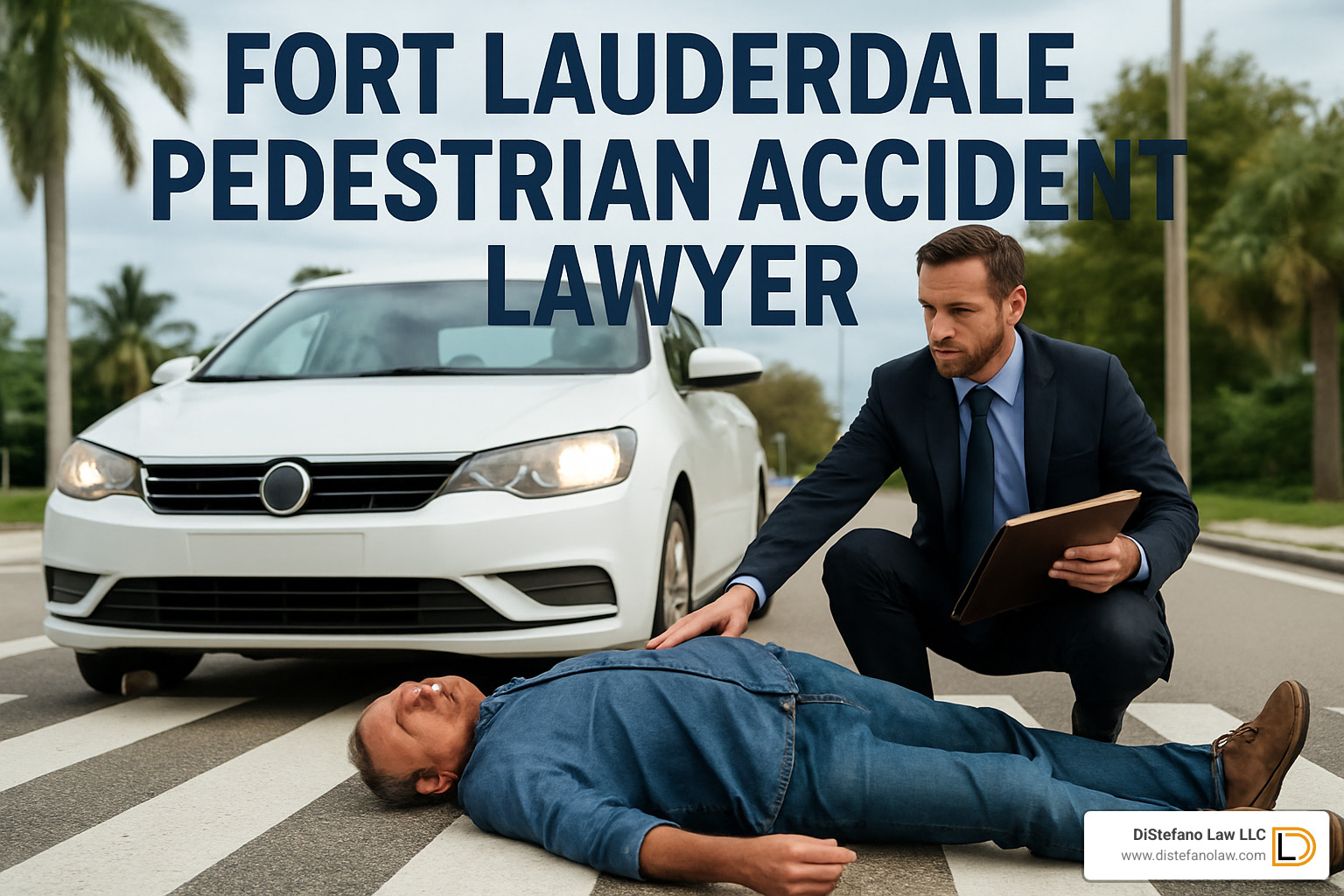
Frequently Asked Questions about Pedestrian Accident Cases in Fort Lauderdale
Over four decades of practice, we’ve heard countless questions from worried pedestrians and their families. Here are the most common concerns.
What is the statute of limitations for filing a lawsuit?
Personal injury claims give you four years from your accident date to file in Florida courts. Wrongful death cases have just two years from the date of death.
While these deadlines might seem generous, waiting hurts your case. Witnesses move away, security footage gets deleted, and physical evidence disappears. Contact a Fort Lauderdale pedestrian accident lawyer within days, not months.
Government cases follow different rules. You must provide written notice within three years to the responsible entity, followed by a six-month waiting period before filing suit.
Can I recover compensation if I was jaywalking or partially at fault?
Yes, you can still recover compensation even when you share blame. Florida follows pure comparative negligence, reducing your compensation by your fault percentage but not eliminating it.
If you jaywalked but the driver was speeding and texting, a jury might decide you were 30% at fault while the driver was 70% at fault. With $100,000 in damages, you’d recover $70,000.
The key lies in minimizing your fault percentage through skilled representation. We’ve handled cases where initial police reports blamed our clients, only to find drivers were drunk or racing.
What should I do if the driver who hit me is uninsured or fled the scene?
Hit-and-run accidents demand immediate police involvement. Share every detail about the fleeing vehicle. Nearby businesses often have security cameras that captured the accident.
Uninsured driver cases might still result in compensation through uninsured motorist coverage on your own policy. This coverage often applies to pedestrians even if they don’t own vehicles.
Crime victim compensation funds provide another potential source of recovery, though amounts are limited compared to typical settlements.
Don’t give up hope because a driver fled or lacked insurance. We’ve recovered significant compensation in cases that initially seemed impossible.
Conclusion
Walking away from a pedestrian accident isn’t just about healing physically—it’s about protecting your future and your family’s financial security. After four decades of helping Fort Lauderdale families through these traumatic experiences, we’ve learned that the legal decisions you make in the weeks following your accident can be just as important as the medical ones.
The path to recovery feels overwhelming when you’re dealing with serious injuries, mounting medical bills, and insurance companies that seem more interested in protecting their profits than your wellbeing. Florida’s comparative fault laws create opportunities for fair compensation, but they also create pitfalls that can cost you thousands of dollars if you don’t understand how to steer them.
Your journey to justice starts with understanding that you have rights, even if you made mistakes that contributed to the accident. Insurance adjusters will try to convince you that jaywalking or distraction eliminates your claim entirely—that’s simply not true under Florida law. What matters is getting experienced legal guidance before you say or sign anything that could hurt your case.
We’ve walked this path with hundreds of families, and we know that every case tells a human story. Behind the medical records and police reports is someone whose life changed in an instant through no fault of their own. Maybe you’re a parent worried about providing for your children while you recover. Perhaps you’re a retiree whose golden years have been shadowed by chronic pain and mobility issues.
You get one opportunity to make this right. Florida’s statute of limitations won’t wait for you to feel ready, and evidence disappears quickly in our fast-moving city. Surveillance footage gets deleted, witnesses move away, and physical evidence at accident scenes changes with weather and traffic.
The insurance company’s first offer isn’t their best offer—it’s their attempt to close your case before you understand the full extent of your injuries and losses. A skilled Fort Lauderdale pedestrian accident lawyer levels the playing field by investigating thoroughly, consulting medical experts, and presenting your case in the strongest possible light.
Our 40-year track record speaks to families throughout Fort Lauderdale who trusted us during their darkest hours. We’ve seen clients go from wheelchairs back to walking, from financial uncertainty to secure futures, from feeling powerless to feeling heard and respected.
The consultation costs you nothing, but the knowledge you gain could change everything. Contact Us today to learn about your rights and options. We’ll listen to your story, answer your questions honestly, and help you understand what fair compensation looks like for your specific situation.
Your healing matters, your family’s security matters, and your voice matters. Let us help you make sure it’s heard.


